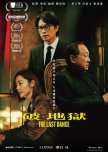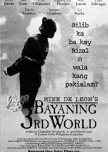
A meta blend of fiction and documentary
Or as Peter Bradshaw, writing for The Guardian, put it: "Buddhist supernatural realism".By the Time It Gets Dark has a clear point of departure: The 1976 Thammasat University massacre. The film draws its initial reflections from the few photographs available from the time, before spending the rest of the film shifting between gaps, silences and layers around and beyond the historical event.
The majority of By the Time It Gets Dark follows the journey of the film-making itself. Not in a behind-the-scenes way, but the struggle of the craft in attempt to convey meaning. It's self-reflexive while, at the same time, not shunning the audience. Don't worry, this isn't one of those arthouse films that experiments for the sake of self-indulgence. You can sense the creators' desire to grapple with the 1976 massacre while struggling to develop and articulate its meanings on multiple levels.
It's not trying too hard, nor is it a chore to watch. When you take this film for what it is, you're able to appreciate it more.
When Ben Kenigsberg from the New York Times said if there couldn't be explanations, then at least there should be "footnotes" and that it'll go over the heads of those not "in sync", I think it's important to note that being "in sync" is besides the point. The visual glitches and play with colour saturation near the end of the film show that that even the creators themselves aren't "in sync" with what is being (or not being) represented.
I don't have this film figured out and you're not meant to. By the Time It Gets Dark is one of those artworks, like poetry, where, if you're trying to figure out what it's 'saying', then you're misunderstanding its existence. If it lingers, then that is sufficient.
Peter Bradshaw's Guardian Review: https://www.theguardian.com/film/2017/jun/16/by-time-gets-dark-review-bangkok-protests-massacre-anocha-suwichakornpong
Ben Kenigsberg's NYT review: https://www.nytimes.com/2017/04/13/movies/by-the-time-it-gets-dark-review.html
Mark Kermode's Guardian Review (I find his reading to be more generous): https://www.theguardian.com/film/2017/jun/18/by-the-time-it-gets-dark-film-review-dazzling-reflections-thai-history
Was this review helpful to you?

Just as problematic as the Taiwanese original :/
Ok so I only watched this because I watched the original Taiwanese versions so many times (which I think I only ever really liked because it was the first Mando-language drama I ever watched). I was really hoping they wouldn't repeat the same ultra problematic coercive control theme for this version, but they have. To more or less the exact same degree as the original which is a shame (and hence the low rating).Otherwise, I do feel like this version has a couple of things going for it. First, I am so grateful they changed the story timeline for this version. Because holy moly, the amount of flashback scenes in the original Taiwanese version was incredibly jarring and confusing. This version tells the story more or less chronologically which has saved a lot of grief.
Second, I liked how Ou Chen was written in this version compared to the Taiwanese. No shade on Peter Ho, I think this was a case of scripting rather than acting. Personally I found this version of Ou Chen a lot more believable than the Taiwanese one. He's also a bit more likeable/human in this version because has his business partners alongside him (rather than the Taiwanese version who was a clear loner).
Luo Xi's character I found more or less on par with the original. Other reviews noted that he seems to be younger in this version but if anything, I think that actually might work better in explaining his character's level of immaturity.
I know I said in my review of the Taiwanese version that Barbie Hsu was a bit lacklustre as Xia Mo compared to other roles she's done. But that said, the one thing she did get spot-on was the 'ice princess' side to Xia Mo's character profile. I found Zhang Xue Ying to be a solid all-rounder though without any real stand out moments.
A couple of things I was really disappointed by were, first, a secondary love story that did exist in the Taiwanese one but only as subtext (not being specific to avoid spoilers). Honestly, it should've stayed as subtext because I skipped most of that storyline in this version of the drama. Second, the music in this version was pretty poor compared to the Taiwanese version. The key difference there is that Barbie Hsu and Peter Ho are professional singers and so were able to contribute their voices.
Was this review helpful to you?

This review may contain spoilers
Needed more CEO shooters
There are already over 100 reviews of this drama so I’m going to focus mostly on the class politics of The Story of Pearl Girl. It’s the fatal flaw of this drama and, oh boy, there’s a lot to chew on.Before I get to that, a quick note on the gender politics. I hard agree with PeachBlossomGoddess who identifies bad gender politics as one of the key flaws at play. Indeed, I was incredibly worried when the ML strayed into Overbearing CEO* territory for a few episodes. Fortunately, the writers didn’t fully pursue that angle, but did ultimately undermine the FL’s fiery spirit in other ways (as PeachBlossomGoddess’s review describes in more detail).
What I think killed The Story of Pearl Girl was its frustratingly contradictory class politics. Now, I promise I’m not about to call the FL a class traitor like I did to Wei Lingyou in my review of Yanxi Palace**. However, what started as a strong underdog narrative for Duanwu in the first half of the drama, collapsed in the second half. Let’s consider the good part first, shall we?
For me, the highlight of the first 18 episodes is the condemnation of the Lawful Good character (don’t worry, we’ll get to ep 18 in a jiffy). This Lawful Good character is embodied by government official Zhang Jinran who believes that, if everyone simply followed the law, then all would be well. Of course, he fails to realise that it takes a high level of privilege – particularly class privilege – to act within the confines of the law.
Our ML, Yan Zijing, is quick to point out that while Zhang’s intentions may be good, his methods are crap: “Mr Zhang, you have a heart to save others but lack the power to do so.” Our FL, Duanwu, backs up this critique of the Lawful Good approach and tells Zhang, “You’re a man on top. You don’t understand how we [the bottom class] are.” This makes perfect sense. After all, even though Duanwu has escaped slavery as a pearl diver, she still struggles to survive. This clap-back at Zhang’s character is incredibly refreshing given the ‘Good Governance’ narrative*** tends to be heavily promoted in most Chinese costume dramas.
However, before the pivot point of ep 18, there were a couple of red flags that things were about to go astray. First, is Cui Shijiu. Shijiu is the daughter of the Cui family that owned the pearl farm on which Duanwu was enslaved. She starts out as a cruel Girl Boss but, after several twists and turns, ends up in a sticky situation. It’s at this point she likens herself to Duanwu. “How am I different from her?” Shijiu says, “Both of us struggling in this world, just trying to grasp our own fate.” Ummm gurl… one of you was a slave, and the other was the master. You cannot get more different than that. Unfortunately, her line of thinking crops up later in the drama (and I’ll get to that below).
The second red flag was Yan Zijing’s appraisal of Duanwu as she works her way up the (metaphorical) ladder on his trade ship. He remarks of her quick progression, “She wants to stand on her own…Many people in this world are stuck in misery, yet don’t want to lift a finger.” Other than the fact this sounds like the ‘dole bludger’ narrative that comes from the lips of conservative politicians, this assessment also misses many factors. One: Yan Zijing doesn’t acknowledge that Duanwu has a lot of natural talents that can be commercialised. i.e. you need more than effort alone. Two: pretty privilege. Big time.
And then finally comes episode 18. This is when the underdog narrative dies. It dies alongside a big handful of characters: all are Duanwu’s lower class friends. She also loses Shrimp, the only character left from her pearl farm days. By killing off all these characters in the Desert Ambush scene, the storyline also effectively severs Duanwu’s class roots. Henceforth, she joins the class of Small to Medium Enterprise owners (read: merchants) and realises her individualistic Girl Boss ambitions.
And…so what? Well, Duanwu enters the jewellery business. And she does so without blinking, which is surprising given she knows that pearls are the aquatic equivalent of blood diamonds. She is fully aware of the cruel supply chains on which she relies to create her jewellery. Yet, they are never mentioned. They are kept entirely off-screen. As far as we know, the pearl farm continues on the same, likely under different management after the fall of the Cui family. All the while – or at least after their brief separation – Yan Zijing pats her on the head and tells her what a good little Girl Boss she is.
I was still interested in seeing what would happen with Cui Shijiu after going through a whirlwind of ups and downs. Her story was a lot more interesting, embracing the complexities of a villain you can’t help but feel for. Near the end of the drama, Shijiu and Duanwu forge an unlikely alliance where Shijiu finally recognises Duanwu as her equal. Purely because she’s her commercial equal. A fellow Girl Boss. Duanwu even refers to Shijiu as her “confidante” and the chumminess between these two leaves a real bad taste in the mouth.
And that bad taste is what The Story of Pearl Girl ends on. Thank god Liu Yu Ning looks good in purple, cos that was the only redeeming feature of this drama.
===
* I use the term “Overbearing CEO” the way Geng Song does in his fantastic article on Chinese workplace dramas, found here: https://www.euppublishing.com/doi/full/10.3366/mclc.2023.0031
**My Yanxi Palace review, ‘Wei Yinglou is a class traitor. Change my mind.’ https://mydramalist.com/profile/TheUnhinged/review/305311
*** I talk about the ‘Good Governance’ narrative more in my review of The Double: https://mydramalist.com/profile/TheUnhinged/review/392435
PeachBlossomGoddess’s review: https://mydramalist.com/profile/PeachBlossomGoddess/review/408704
Was this review helpful to you?

Souls trapped in the human realm, unable to move on
As much as I hate to admit it, it was the movie adaption of John Green's The Fault in our Stars that taught me, "Funerals... are not for the dead. They are for the living."From watching the trailer, I thought this film would be presented in clashes of dichotomies: death vs life, tradition vs modernity, religion vs industry. And while all these themes do surface in the film, they don't do so as mutually exclusive dichotomies. Instead, the richness of The Last Dance comes from the intersections and overlap of these themes.
The story structure itself is neat. There are three parts and the narrative comes fulls circle, starting and ending with the Taoist funeral ritual of Breaking Hell's Gate. The cinematography of the ritual scenes alone could carry the film if needed. But the bulk of the film is what provides the emotional impact of these scenes.
The strength of this film is its messiness. And the messiness is found at the intersections. Tradition and modernity don't so much clash with one another as grasp out to one another, trying to find purchase, albeit sometimes in awkward or painful ways. This doesn't only play out in the funeral home between the male leads. The friction and fondness also happens within the family home as the characters try to figure out how religion features in their own identities and how it impacts their relationships with one another. There is also just enough wry humour – mostly from Dayo Wong's character – to provide breathing space (pun intended).
Unsurprisingly, there is a lot of death in this film. Despite the music being a tad heavy-handed at times, these are emotionally deep touch points. Each death progresses the narrative and also reveals some new aspect to the intersecting themes of the film.
To bring this review back to full circle, The Last Dance itself is for the living. Perhaps this is why we don't ever get to see any of the deceased characters on screen alive. The film is *about* the living because it is *for* the living. After all, no one gets to see their own funeral.
NB: "Souls trapped in the human realm / Unable to move on" are the translated lyrics of Terence Lam's song 普渡眾生 which plays during the credits.
Was this review helpful to you?

When the only interesting part of someone's life is their execution.
This docudrama is surprisingly hilarious. It's also cleverly meta – in more ways than one.Bayaning 3rd World follows a couple of filmmakers keen to cast a critical eye on José Rizal as The Phillipines' national hero. But at the same time, they struggle to figure out how to transform their take on Rizal's life into an engaging movie. So Bayaning 3rd World is a story about telling the story.
The humour comes from the filmmakers (who are not the actual filmmakers, btw, they're actors). They playfully navigate and interrogate this huge figure of Filipino nationalism. The storytelling style reflects this playfulness too – the filmmakers sit down with Rizal's family members and "interview" them. None of this is to say they are disrespectfully mocking Rizal. Quite the contrary, it's clear that the makers of Bayaning 3rd World are 100% sincere in their poking and prodding of what has made Rizal into a national hero.
One sticking point is Rizal's "retraction document". Supposedly, just before his death, Rizal converted back to Catholicism and, in doing so, retracted all his previous criticisms of the Church. But Bayaning 3rd World questions this version of events, suggesting that the document might be inauthentic. Why the fuss? Well, as one of the filmmakers points out, in Rizal's era, the Church and the State were one and the same. So for Rizal to renounce his criticism of the State would make him less worthy of national hero status.
To add another layer to this meta docudrama, it's important to note that director Mike de Leon made Bayaning 3rd World in response to the film 'José Rizal'. Directed by Marilou Diaz-Abaya, 'José Rizal' had come out two years earlier in 1998 as part of the centenary commemorations of Filipino independence.
To quote Antonio D. Sison's commentary, "In Diaz-Abaya’s film, Rizal is the prodigal son who returns to the colonial Catholic religion of his oppressors and renounces the very works that 'served to restore dignity, self respect, pride, and patriotism among the Filipinos'. De Leon makes an intellectual and entertaining effort at questioning this cut-and-dry story but without actually providing answers himself".
At the end of the day – hero or not – Rizal is still the central character to Bayaning 3rd World. Of course, it could've been otherwise. As one of the filmmakers remarks more than once after "interviewing" one of the women in Rizal's life – "Her life would be a much more interesting movie than Rizal's!"
===
Antonio D. Sison's review: https://www.sensesofcinema.com/2005/feature-articles/3rd_world_hero/
Was this review helpful to you?

a religious production with rich anti-colonial flavour
This film caught me unawares. I was not expecting a Christian production from *checks notes* Jesuit Communications to be of this high quality. But that's because Gomburza "isn't just about church politics", to lift a line from one of the characters.The premise of the movie is relatively straightforward: Filipino-born priests fight to be seen as equals to Spanish-born friars. Eventually, the priests are caught up in broader anti-colonial struggles at great peril.
However, less straightforward is the underlying question of the whole film: what is the Filipino identity? Of course, the film does not – and cannot – answer this. And to be fair, it doesn't try. It is the posing of this question that lends the film an extra layer of sophistication and makes up for some of the poorer writing in the first half.
The narrative premise and the underlying identity question do result in a split focus. The storyline revolves around José Borgos as one of the key individuals fighting to be recognised on equal footing to the Spaniards. But the storyline also diverts, often awkwardly, to follow poorly developed side characters who are meant to form an important part of the broader anti-colonial movement and theme.
Despite the meandering, Gomburza is an intellectually engaging film – at least for me as someone completely unacquainted with the history. It is also a highly emotive film, something I didn't realise until it crept up on me in the last twenty minutes and I found myself bawling my eyes out even though I thought I hadn't developed an attachment to the characters.
All in all, as someone who grew up in Anglican and Uniting Church spaces here in Aus, seeing a religious production with a powerful anti-colonial flavour is incredibly refreshing. Colour me impressed.
Was this review helpful to you?

Mahjong? more like Nahhh-jong
This is an odd film. The story centres around the competition between two family members vying to inherit a Mahjong house.At least I think that was the plot? Honestly, it was pretty boring so I had it on in the background while I was doing work. I'd say the first and last 20 minutes were the only vaguely interesting parts of the film.
The pacing is slow, the stakes don't really seem that high, there's little intrigue, the characters feel flat, and the eccentric humour is...well....eccentric.
Personal highlight was Betty's hair, makeup, and costuming; it gave the aesthetic a touch of retro cool.
Was this review helpful to you?

Romanticisation at a cruel cost
The credits roll and my first thought is: What is the Filipino take on all this?But we’ll get to that shortly.
The film Onoda is the fictionalised story of Hiroo Onoda, one of the last Japanese soldiers to surrender after the end of WWII. He was a ‘holdout’ on the Filipino island of Lubang until 1974. He survives in the jungle in denial of the war's end, losing his compatriots one by one. The story is fictionalised in more ways than one, but we’ll get to that shortly too.
At face value, the movie is surprisingly engaging given its long run time. There are also some pretty landscape shots. But that’s about all the positives I have for this piece of cinema. Buckle yourself in, folks!
Let’s start with a simple point. For a story so embedded in its Filipino geography, the decision to shoot in Cambodia feels off. And there’s good reason.
It’s a European production…with a French director…about a Japanese soldier…in the Philippines. Yes, that should raise an eyebrow.
“If you add up all those nationalities [who worked on the film], it makes the film from nowhere,” director Arthur Harari says in an interview with Asian Movie Pulse.
Yet, Cambodia was the destination of choice because Harari wanted a French-speaking film crew. Cambodia is a former French colony. It's certainly not “nowhere”. Neither is Lubang. The shoot location is only one of the ways in which colonial politics seeps into this cinematic production.
Many a filmmaker has simped for the romantic man-survives-jungle trope and Harari is no different, citing the likes of Joseph Conrad as original inspo for this movie. But it comes at cruel cost to the Filipino characters and their real-life counterparts.
I agree with James Lattimer’s assessment that the Filipino characters are used as “little more than cannon fodder”. Harari’s avoidance of the Filipino side – in terms of both geography and narrative – is a result of wilful ignorance. That is because he relies on Onoda the myth, not Onoda the man.
In true à la française style, Harari projects some kind of universalist reading of human experience onto Onoda’s story.
“I didn’t read historical books about Japan or the war,” he admits in an interview, “because the fact is that everything about Onoda’s story can be understood even if you don’t really know the general situation of the war, the Pacific War, or the history of Japan.”
In fact, Harari only read one book about Onoda, written by two Frenchmen: ‘Onoda: Seul en guerre dans la jungle’. As far as I can tell, the text seems sympathetic to Onoda’s side of the story, describing Onoda as a “prisoner of that island, of that oppressive jungle” (own translation). Heart of Darkness much? Either way, Harari mostly upholds the romantic hero image of Onoda in the film, an image which Onoda himself first established when he published his autobiography.
But even a little bit of reading about Japan or the war reveals how the Filipino people were cruelly caught in colonial crossfire. Their lives and land were used as military props and staging by the Japanese (and, of course, the Spanish and the Americans before that).
Onoda’s autobiography omits Onoda’s many gruesome murders of Lubang’s residents. Tsuda Shin, ghost-writer of Onoda’s autobiography, revealed this much when he wrote his own exposé on Onoda a couple of years after the autobiography came out.
Even now, it’s Harari’s cinematic project that receives the funding and the spotlight. Meanwhile, the Filipino side of the story struggles to see the light of day. Mia Stewart has set out to correct the record via documentary making. Her maternal relatives lived – and still live – in Lubang and experienced first-hand Onoda’s violent atrocities.
“They weren't just shootings, there were very violent killings that involved beheadings and mutilating bodies,” Stewart says in an interview with SBS.
Lack of funding means her documentary still hasn’t been released. But it’s a good cause. A myth like Onoda’s needs interrogation.
“We will never really know if Onoda knew the war was over or not. Regardless, he killed civilians. While I can't undo those deaths, I can change how we tell the story,” Stewart says.
----------
Stewart’s forthcoming documentary, ‘Searching for Onoda’: https://searchforonoda.com/
Stewart’s interview with SBS: https://www.sbs.com.au/news/article/mias-uncle-bled-to-death-she-wants-to-set-the-record-straight-about-why/qig3whkdb
Insights on Harari’s approach come from this excellent A. E Hart piece: https://www.documentary.org/online-feature/domitable-myth-three-depictions-japanese-holdout-soldier-hiroo-onoda
James Lattimer’s review: https://www.bfi.org.uk/sight-and-sound/reviews/onoda-10000-nights-jungle-lost-filipino-wilds
Was this review helpful to you?

Lawful Good types are the worst
Di Renjie is your typical cop/detective protagonist archetype – a dude who says they want to deliver justice for the everyday person – but then spends a lot of time faffing around and being a pain in the arse because they unwaveringly stick to their belief in the law. This is also makes him very, very dull.That's not to say the series doesn't have a couple of good moments. But my goodness, this made excellent watching to help me get to sleep. The pacing is slow. All the characters are underdeveloped. The visual production is nice but the audio was constantly having a bad hair day.
And all in all, am I really meant to like Di Renjie as a character? For someone that cluey, he never does seem to figure out that the law and justice actually don't really have much in common. And yet he's doggedly dedicated to be, well, a dog.
He seems to serve the interests of an empress that we see at the start and then never again until the preview of season 2. I'd perhaps be more interested if that relationship was explored a bit more. Instead, we just have to accept him as a stickler for the rules. Straight laced. Vanilla. Boring.
Was this review helpful to you?

This movie could've been an email
I normally avoid watching C-dramas set during the republican era as they tend to be the most heavily lathered in government propaganda. 1911 is case in point.The film tells the story of the 1911 revolution (or the Xinhai revolution as it's otherwise known). I'm not surprised that this particular event was the subject of such hammed-up propaganda given the revolution is key to the grander political myth-making of the modern Chinese state. That said, you can still do propaganda a lot better than this??
The storyline reads like my high school essays on Bolshevik Russia. It's a boring chronology of events with political commentary slapped across the top. The music and melodrama seems to indicate that you're meant to care about the characters on screen. But you don't.
It's normally a pretty safe choice to start a story in the middle of the action – in this case the failed Second Guangzhou Uprising – but without an emotional hook to the characters, mid action scenes exhaust their oxygen pretty fast. By following a Great Men of History approach, the main characters feel flat and 2D, their entire psyche presented in the form of political speeches or the flashing of guns.
By the end of the film, you're feeling pretty uninspired. There's a lot of monologuing where you start to think the character just likes the sound of their own voice. Jackie Chan is the only one allowed to wear a leather jacket for some reason. And the two normie characters who should've been the soul of the movie are really awkwardly tacked on at the beginning and end.
tbh, it's quicker and more interesting to read the wikipedia page.
Was this review helpful to you?

This review may contain spoilers
#HottiesForGoodGovernance
I love bad boys. I especially love bad boys with sharp wit, dressed in black, and adorned with a fan to show that fragile masculinity is a foreign concept to them.What I don't love is when a bad boy turns out to be not a bad boy at all.
Before I go any further, I'm setting PeachBlossomGoddess' review as pre-requisite reading because their review matches exactly my thoughts and feelings on The Double. The point on which I will extrapolate is why I think the drama ultimately undermines itself.
For me, The Double fails to follow through on what is a very powerful swing during the first half of the series. And this is for two reasons. The first, as PeachBlossomGoddess describes, is weak plot lines echoing those of other dramas of this genre.
The second reason, I argue, is the second half kills a boner. No, seriously, bear with me here. This drama is horny AF. In the first half, you have a FL and a ML equal in terms of looks and wit dancing around each other as they glide from suspicion to mutual trust to deep thirsting for one another.
The appeal of the ML derives partly from mystique. He has a sharp mind and, as explicitly stated, he is projecting himself in a similar direction to the FL. Although he doesn't ultimately give up his dom position, there's enough switching between the two to keep the power dynamic infused with sexual tension. At the initial stages of the drama, we don't know the ML's background nor his intentions. The fact he appears to be a bit of a lone wolf lends him an even sexier air; the idea that he isn't at someone else's beck and call.
Or is he?
It was a disappointment to find out that the ML, all this time, has been in cahoots with the emperor. I feel like you'd be disappointed too if you were crushing on a silver-tongued, hot and brooding colleague at work only to find out they're actually the boss' right-hand man. idk about you, but that gives me the ick.
Sorry but maintaining the status quo isn't sexy. I'm not saying everyone has to be a rebel or underdog in order to be attractive. However, if you're going for the Bad Boy Hottie approach, supporting the vanilla and (assumedly?) benevolent monarch kinda takes the edge off.
Honestly, this isn't an issue unique to The Double. It's probably safe to say that, to get government approval at all, the good governance narrative must endure in these historical C-dramas. As I've mentioned in other reviews, it's a common trope to have the FL and ML protect the emperor's power (or help the 'rightful' emperor ascend), even though at no point do we see proof that the emperor actually does anything beneficial for his people.
Which is why, by the end of the series, there's not much substance to the political plot. Oh goodie, #HottiesForGoodGovernance win again. I'm shocked. How grand, the ML and FL have mellowed and now have domestic bliss. Sly smiles and black coats be damned.
And y'know what? If it wasn't for Shen Yurong losing his cool right at the end, he could've been a great Bad Boy Hottie. Uxoricide aside, I'd personally love for a morally ambivalent (and conveniently good looking) scholar to come brood in my corner. Let's hang out, shall we? I know a great graveyard.
Was this review helpful to you?

And that, kids, is how you unionise!
From that start, the plot didn't feel right. Why would a domestic servant have any real romantic feelings for their master? So needless to say the final episode was a big 'ah now that makes sense' moment.That said, as much as I enjoy lower class insurgency and rooting for underdogs, the plotline was terribly executed. Because it spent more time delving into the backstories of the Evil Masters Of The House more than the servants, you had very little sense of who the servants were as human beings.
I understand why the storyline worked that way. It would've been very hard to explore Khaimook's character in-depth, for example, without giving away the big plot twist. However, it does mean the ending feels shallow. Sure – I want these people to land on top. But only on principle. Not because I feel any sentimental attachment to the individuals themselves.
Also, just as a heads up, this series does stray into torture porn territory at times. You can skip those scenes: it's lazy writing and doesn't really contribute much overall.
Was this review helpful to you?

Finishes what Princess Agents (2017) started
I watched this drama purely for the sake of the FL and ML who most of us know from Princess Agents (PA). I was disappointed by what I saw as an unresolved ending to PA and so was very excited when the Legend of Shen Li popped up on my radar. On that point, I feel like the drama's creators had an easy job on their hands. For me at least, it seemed they could rely on the romantic chemistry pre-existing between the two lead characters (even if it was non-canon) and therefore develop a love story quickly and... weirdly?? The Chicken x Human romance gave me Bee Movie (2007) energy... Take that how you will!In the end, I was incredibly satisfied with the romantic plotline. The rest of it, however, was pretty underwhelming. The side characters are poorly developed and the fantasy conflict elements are hodgepodge. Nonetheless, I still enjoyed it as an easy watch.
Was this review helpful to you?

Larger-than-life tragedy about... work health and safety?
Yuu, when we first meet him, is in a state of misery. He works at his village's mega waste facility as a garbage sorter by day and illegal waste dumper by night, coerced into the work due to his mother's gambling addiction. His life takes a turn for the better when his childhood friend, Misaki, moves back to the town. The two share a love of Noh: an important tradition in the village.From the start, the stakes are clear: environmental destruction, worker exposure to deadly hazards, and deep corruption among local authorities. In many respects, this film could have been a documentary. The tale it tells is one currently happening around the world.
But to avoid banality and hitting too close to home, the film's creators have opted for a larger-than-life tragedy approach to the story. The result is a high quality production with beautiful cinematography, especially the shots focussing on the Noh tradition of the village. Unfortunately, this comes at a cost to narrative cohesion, character development, and pacing.
The split focus of The Village means it ultimately fails to pack a punch. While it does have a strong tragedy element that explores the morally ambiguous nature of coerced labour, the supporting characters are just a little too underdeveloped to make it work. Maybe give this reel a sharp edit and try again.
Was this review helpful to you?

Just go watch Lost instead
Anatahan is a fictional retelling of the Japanese soldiers stranded on the Pacific island of Anatahan from 1944 to 1951. In both the real story and this one, they refused to believe the war was over.This film features a Japanese cast and has dialogue all in Japanese, but the director (who also narrates the story in English) is a white dude who lathers the story with a heap of racist exotification and sexism. All in all, it's a pretty Western production.
As such, the story ends up as a crude Lord the Flies with the one woman on the island tossed around as part of the ongoing power struggle. The narrator and the other characters spend the entire film objectifying and harassing her (also content warning for domestic violence and rape, if you plan on watching this).
It's a shame because the premise of the story is an interesting one. Holding out on a stranded island for years on end has been the premise of many of a good piece of cinema. Yet this film flops. Badly.
Was this review helpful to you?




